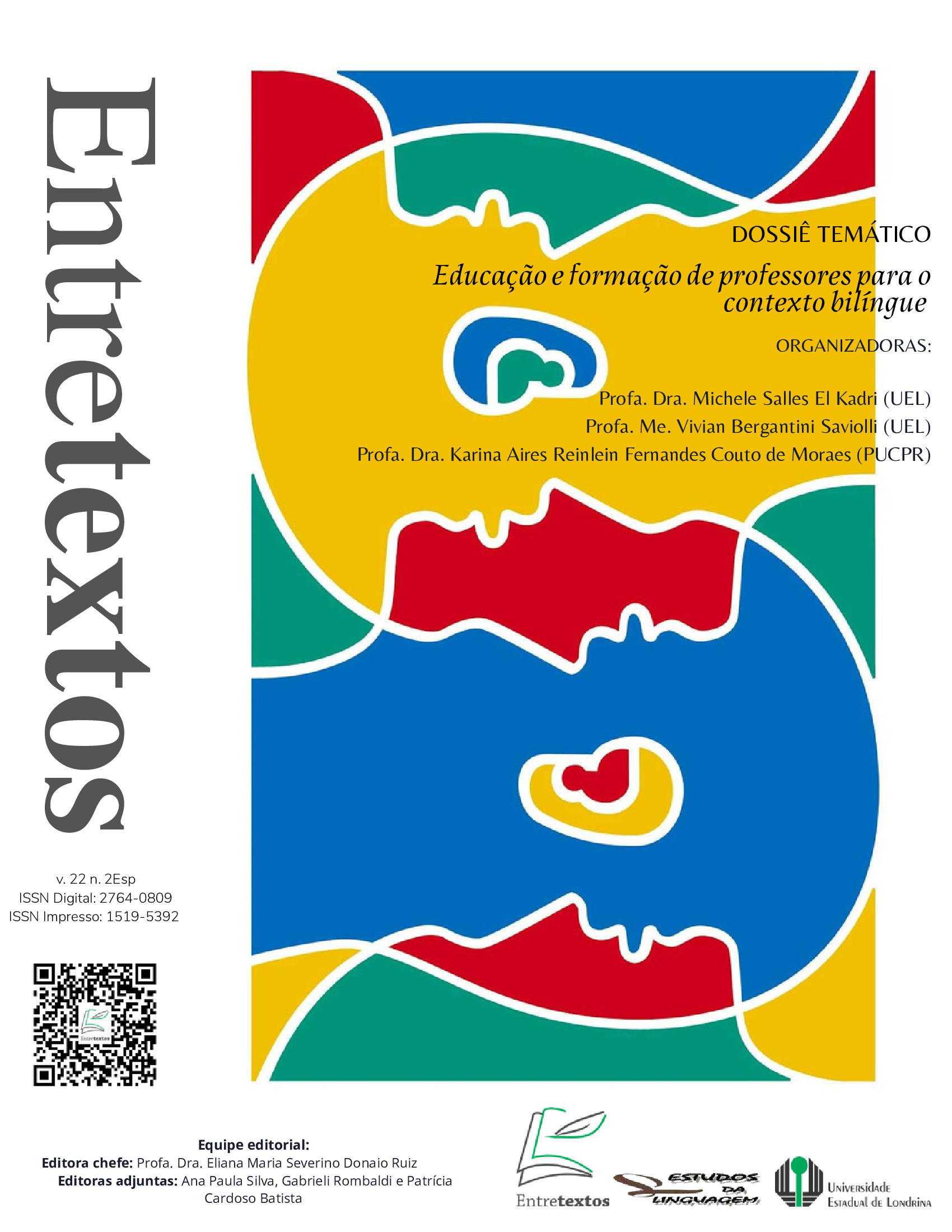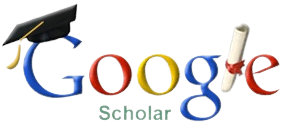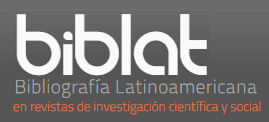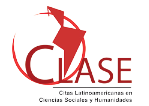I - Bilingual teacher? a study about the representations of the bilingual subject
DOI:
https://doi.org/10.5433/1519-5392.2022v22n2Esp.p42Keywords:
Bilingual teacher , Identity representation , Bilingual educationAbstract
Bilingual education of prestige has gained significant evidence in the Brazilian
educational scenario since the 20th century. However, the identities of bilingual teachers,
which is an integral part of this evolution, is still searching for a definition. Therefore, we soughtto analyse the reasons why the teachers who work in a prestigious Brazilian bilingual
private school in the city of Campo Grande, Mato Grosso do Sul, used to call themselves
bilingual. In order to do so, we used the concepts of bilingual subject and heteroglossia by
García (2009), linguistic repertoire by Busch (2012) and Gumperz (1964) and, finally, culture
by Kramsch (2001). This study, based on the previously mentioned authors, questions
bilingualism as the simple fact of speaking two languages and, consequently, understands it
as a multidimensional phenomenon, which interferes in the sociocultural, psychological, and
linguistic fields of the individual. Data were collected through a semi-structured interview and
a questionnaire by means of descriptive-exploratory research. Findings suggest that all the
participants consider themselves bilingual despite having divergent views of what a bilingual
subject is.
Downloads
References
BAKER, C.; PRYS, J. Encyclopedia of bilingualism and bilingual education. Staple Hill: Multilingual Matters, 1998.
BIALYSTOK, E. Bilingualism in development: language, literacy, cognition. New York: Cambridge University Press, 2001. DOI: https://doi.org/10.1017/CBO9780511605963
BLOOMFIELD, L. Linguistic aspects of science. Philosophy of Science, [s. l.], v. 2, n. 4, p. 499-517, 1935. DOI: https://doi.org/10.1086/286392
BRASIL. Artigo 62 da Lei nº 9.394 de 20 de Dezembro de 1996. Estabelece as diretrizes e bases da educação nacional. Brasília: Presidência da República, 1996. Disponível em: https://www.jusbrasil.com.br/busca?q=Art.+62+da+Lei+de+Diretrizes+e+Bases++Lei+9394%2F96. Acesso em: 26 ago. 2022.
BRASIL. Ministério da Educação. Conselho Nacional de Educação. Parecer CNE/CEB nº 2/2020, aprovado em 9 de julho de 2020. Diretrizes Curriculares Nacionais para a oferta de Educação Plurilíngue. Brasília: MEC, 2020. Disponível em: https://normativasconselhos.mec.gov.br/normativa/view/CNE_PAR_CNECEBN22020.pdf?query=Curr%C3%ADculos. Acesso em: 26 ago. 2021.
BUSCH, B. Linguistic repertoire and spracherleben, the lived experience of language. [S. l.]: Working Papers in Urban Language & Literacies, 2015.
BUSCH, B. The Linguistic repertoire revisited. Applied Linguistics, Oxford, v. 33, n. 5, p. 503-523, 2012. DOI: https://doi.org/10.1093/applin/ams056
BUTLER, Y. G.; HAKUTA, K. Cognitive factors in children’s L1 and L2 reading. Academic Exchange Quarterly, New York, v. 10, n. 1, p. 23–27, 2006.
CONSELHO ESTADUAL DE EDUCAÇÃO (Rio de Janeiro). Deliberação CEE Nº 341, de 12 de novembro de 2013. Estabelece normas para a oferta de ensino bilíngue e internacional na educação básica, pelas instituições pertencentes ao sistema de ensino do estado do Rio de Janeiro. Rio de Janeiro: CEE, 2013. Disponível em: http://www.cee.rj.gov.br/deliberacoes/D_2013-341.pdf. Acesso em: 26 ago. 2021.
CONSELHO ESTADUAL DE EDUCAÇÃO DE SANTA CATARINA (Florianópolis). Resolução CEE/SC Nº 087, de 22 de novembro de 2016. Estabelece normas para a oferta da Escola Bilíngue e Escola Internacional em escolas da Educação Básica pertencentes ao Sistema de Ensino do Estado de Santa Catarina. Florianópolis: CEE, 2016. Disponível em: https://normativasconselhos.mec.gov.br/normativa/view/CEE-SC_Resoluo2016087CEESC.pdf?query=lecionar. Acesso em: 26 ago. 2021.
COOK, V. Linguistics and second language acquisition: one person with two languages. In: ARONOFF, Mark; RESS-MILLER, Janie. The handbook of linguistics. Malden, MA: Blackwell, 2003. p. 488-501. DOI: https://doi.org/10.1002/9780470756409.ch20
DERRIDA, J. O monolinguismo do outro ou a prótese da origem. Tradução: Fernando Berardo. Porto: Campo das Letras, 2001.
GARCÍA, O. Bilingual education in the 21st Century: a global perspective. Malden, MA: Basil/Blackwell, 2009.
GARCÍA, O.; WEI, L. Translanguaging: language, bilingualism, and education. London: Palgrave Macmillan, 2014. DOI: https://doi.org/10.1057/9781137385765_4
GERHARDT, T. E.; SILVEIRA, D. T. Métodos de pesquisa. Porto Alegre: Editora Da UFRGS, 2009.
GROSJEAN, F. Life with two languages. Cambridge: Cambridge University Press, 1982.
GUMPERZ, J. Linguistic and social interaction in two communities. American Anthropologist, Washington, v. 66, n. 6, pt. 2, p.137-53, 1964. DOI: https://doi.org/10.1525/aa.1964.66.suppl_3.02a00100
HAKUTA, K. Mirror of language: the debate on bilingualism. New York: Basic Books, 1986.
HAMERS, J.; BLANC, M. Bilinguality and bilingualism. Cambridge: Cambridge University Press, 2000. DOI: https://doi.org/10.1017/CBO9780511605796
KRAMSCH, C. Intercultural communication. In: CARTER, R.; NUNAN, D. (ed.). The Cambridge guide to teaching english to speakers of other languages. Cambridge: Cambridge University Press, 2001. p. 201-206. DOI: https://doi.org/10.1017/CBO9780511667206.030
MACKEY, W. F. The description of bilingualism. In: WEI, Li. The bilingualism reader. New York: Routledge, 2000.
MACNAMARA, J. Bilingualism in the modern world. Journal of Social Issues, v. 23, n. 2, p. 1-17, Apr. 1967. DOI: https://doi.org/10.1111/j.1540-4560.1967.tb00571.x
MAHER. T. M. Do casulo ao movimento: a suspensão das certezas na educação bilíngue e intercultural. In: CAVALCANTI, M. C.; BORTONI-RICARDO, S. M. (org.). Transculturalidade, linguagem e educação. Campinas: Mercado de Letras, 2007. p. 67-94.
MARCELINO, M. Bilinguismo no Brasil: significado e expectativas. Revista Intercâmbio, São Paulo, v. 19, p. 1-22, 2009. Disponível em: http://www.pucsp.br/pos/lael/intercambio/pdf/1_Marcello_Bilinguismo%20no%20Brasil.pd. Acesso em: 26 ago. 2021.
MEGALE, A. H. Eu sou, eu era, não sou mais: um relato de sujeitos fal(t)antes em suas vidas entre línguas. 2012. 187 f. Dissertação (Mestrado Linguística Aplicada e Estudos da Linguagem) - Pontifícia Universidade Católica de São Paulo, São Paulo, 2012.
MEGALE, A. H. A Formação de professores para a educação infantil bilíngue. Pátio Educação Infantil, Porto Alegre, p. 1-5, abr. 2014. Disponível em: https://www.academia.edu/Documents/in/Educa%C3%A7%C3%A3o_Bil%C3%ADngue_E_Forma%C3%A7%C3%A3o_De_Professores. Acesso em: 26 ago. 2021.
MEGALE, A. H. Memórias e histórias de professores brasileiros em escolas bi/multilíngues de elite. 2017. 235 p. Tese (Doutorado Linguística Aplicada) - Instituto de Estudos da Linguagem, Universidade Estadual de Campinas, Campinas, 2017. Disponível em: http://www.repositorio.unicamp.br/handle/REPOSIP/325801. Acesso em: 20 out. 2021.
MOURA, S. de A. Com quantas línguas se faz um país? Concepções e práticas de ensino em uma sala de aula na educação bilíngue. 2009. 141 f. Dissertação (Mestrado Educação) - Universidade de São Paulo, São Paulo, 2009.
NORTON, B. Non-Participation, Imagined Communities, and the Language Classroom. In: BREEN, M. (Ed.), Learner Contributions to Language Learning: New Directions in Research. p. 159-71. Harlow: Pearson Education.2001
OXFORD advanced learner’s dictionary. Oxford: Oxford University Press, 2000.
RAJAGOPALAN, K. The identity of “world english”. In: GONÇALVES, G. R.; ALMEIDA, S. R. G.; PAIVA, V. L. M. de O.; RODRIGUES-JÚNIOR, A. S. (org.). New challenges in language and literature. Belo Horizonte: FALE/UFMG, 2009. p. 97-107.
RODRÍGUEZ-ALCALÁ, C. Língua, nação e nacionalismo: um estudo sobre o guarani no Paraguai. 2000. 254 p. Tese (Doutorado em Linguística) - Instituto de Estudos da Linguagem, Universidade Estadual de Campinas, Campinas, 2000.
SAER, D. J. The effects of bilingualism on intelligence. British Journal of Psychology, London, v. 14, p. 25-38, 1922. DOI: https://doi.org/10.1111/j.2044-8295.1923.tb00110.x
SALGADO, A. C. P.; TEIXEIRA, P. M.; CORREA, T. H.; ROCHA, W. I. Formação de professores para a educação bilíngue: desafios e perspectivas. In: CONGRESSO NACIONAL DE EDUCAÇÃO, 9., ENCONTRO SUL BRASILEIRO PSICOPEDAGOGIA, 3., 2009, Curitiba. Anais [...]. Curitiba: PUC-PR, 2009, p. 8042-8051.
TITONE, R. Le Bilingualisme Précoce. Brussels: Dessart, 1972.
WEI, L. Dimensions of Bilingualism. In: WEI, L. The bilingualism reader. New York: Routledge, 2000.
Downloads
Published
How to Cite
Issue
Section
License
Copyright (c) 2022 Entretextos

This work is licensed under a Creative Commons Attribution 4.0 International License.
Entretextos adota a Licença Creative Commons Attribution 4.0 International, portanto, os direitos autorais relativos aos artigos publicados são do/s autor/es.
Sob essa licença é possível: Compartilhar - copiar e redistribuir o material em qualquer suporte ou formato. Adaptar - remixar, transformar, e criar a partir do material, atribuindo o devido crédito e prover um link para a licença e indicar se mudanças foram feitas.






















